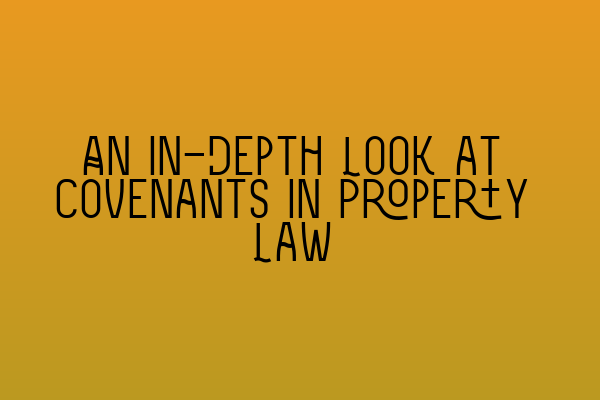An In-Depth Look at Covenants in Property Law
Covenants play a crucial role in property law, serving as legally binding agreements between parties involved in a property transaction. Understanding covenants is essential for both solicitors and individuals navigating the complexities of property law. In this blog post, we will provide you with an in-depth look at covenants in property law, exploring their types, enforceability, and implications.
What are Covenants?
In property law, covenants are promises or undertakings made by one party to another, typically relating to the use, maintenance, or restrictions associated with a property. They are found in various property-related documents such as leases, contracts of sale, and property deeds.
Types of Covenants
There are two primary types of covenants: positive covenants and restrictive covenants.
Positive Covenants: Positive covenants require an individual to perform a specific task or act, such as maintaining the property or paying rent on time. These covenants impose an obligation on the party to take affirmative action.
Restrictive Covenants: On the other hand, restrictive covenants forbid certain actions or uses of land. They impose limitations on property owners to protect the interests of neighboring properties or the general community. Common examples include restrictions on building height, use of the property for commercial purposes, or keeping certain types of pets.
Enforceability of Covenants
The enforceability of covenants depends on various factors such as the type of covenant, its wording, and the circumstances surrounding its creation. Covenants can be either:
1. Positive Covenants: Positive covenants are seldom enforceable against subsequent owners of the property unless they have expressly agreed to be bound by them. However, they may be binding on the original parties involved in the covenant.
2. Restrictive Covenants: Restrictive covenants, also known as negative covenants, can be enforced against subsequent owners of the property, even if they did not originally agree to the covenant. This is known as the “benefit and burden” principle, where the original parties intended the benefit of the covenant to run with the land.
Implications of Covenants
Covenants have significant implications for property owners, buyers, and sellers. Understanding these implications is vital for ensuring compliance and avoiding potential legal issues.
For Property Buyers: Before purchasing a property, it is crucial to thoroughly review the title deeds and other relevant documents to identify any covenants that may affect the property’s use or value. Engaging a solicitor who specializes in property law can help you navigate these complexities and assess the impact of covenants on your intended use of the property.
For Property Sellers: Sellers should disclose any significant covenants to potential buyers to ensure transparency and prevent future disputes. Failure to disclose relevant covenants could result in legal consequences, including the cancellation of a sale agreement or financial compensation claims.
Enforcement Proceedings: In case of a breach of covenant, enforcement proceedings may be initiated by the affected party. This could involve seeking an injunction to stop the action that breaches the covenant or claiming monetary damages for any loss suffered as a result of the breach.
Conclusion
Covenants form a fundamental aspect of property law, governing the relationship between property owners and defining their rights and obligations. Understanding the types of covenants, their enforceability, and implications is crucial for both solicitors and individuals involved in property transactions.
If you are preparing for the SQE exams or wish to improve your knowledge of property law, be sure to check out our related articles on SQE 1 practice exam questions, SQE 1 practice mocks FLK1 FLK2, SQE 2 preparation courses, SQE 1 preparation courses, and SRA SQE exam dates.
At SQE Property Law & Land Law, we provide comprehensive training and guidance to help aspiring solicitors excel in their legal careers. Our team of experts is dedicated to equipping individuals with the knowledge and skills they need to succeed in the ever-evolving field of property law. Contact us today to learn more about our SQE preparation programs and take the first step towards a successful legal career.
